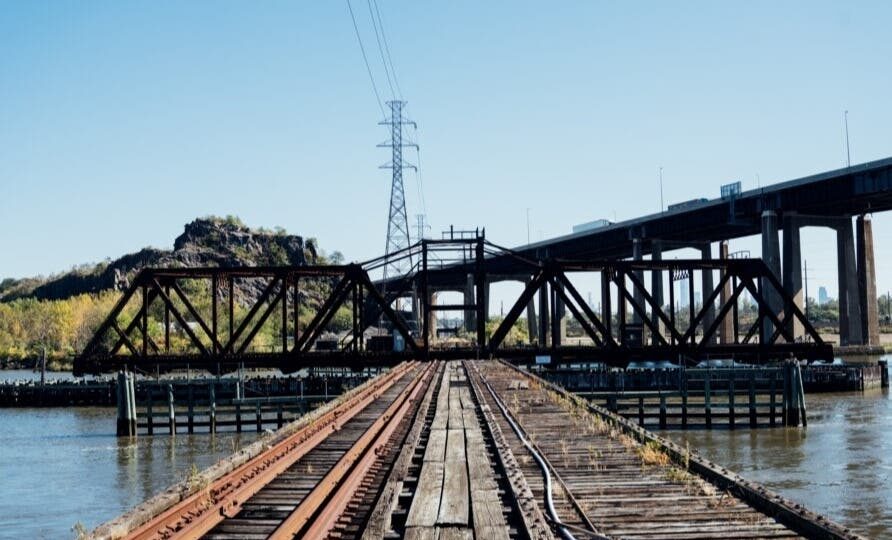Essex-Hudson Greenway Update
New details about a highly anticipated “greenway” that will connect eight municipalities in North Jersey were recently unveiled, including a plan to add mass transit to the mix.
New Jersey turned heads three years ago when officials announced that it will be creating its first new state park in more than a decade. Dubbed the Essex-Hudson Greenway, the project will transform an old, defunct nine-mile railroad line into a 100foot-wide biking and hiking path, complete with flood-fighting greenery, “activity centers” and family friendly gathering spaces. There are also plans to partner with NJ Transit to extend the Secaucus Meadowlands Transit way along a portion of the greenway.
The ambitious project will cross above the Passaic and Hackensack rivers and pass through eight towns: Bloomfield, Belleville, Glen Ridge, Jersey City, Kearny, Montclair, Newark and Secaucus.
A groundbreaking on the first portion of the project is expected in Spring 2025, NJDEP officials said.
The New Jersey Department of Environmental Protection (NJDEP) held an open house last week at Park Elementary School in Newark to update the public about the latest plans.
The greenway will be funded through a combination of state and federal appropriations. New Jersey lawmakers and Gov. Phil Murphy ear-marked $35 million for the project in the 2025 state budget.
“Together, we are writing an exciting new chapter in the state’s history,” NJDEP commissioner Shawn LaTourette said in the wake of last week’s open house.
Where and when
There are three sections of the project: Central, West and East.
Greenway Central will be located in Newark. Greenway West will cross through Montclair, Glen Ridge, Bloomfield and Belleville. Greenway East will cross through Kearny, Secaucus and Jersey City.
The greenway will connect residents to parks, schools, hospitals and business districts, in addition to offering commuters a way to bypass some of New Jersey’s most congested roadways. It will pass near the Newark light rail and NJ Transit’s Frank R. Lautenberg Secaucus Junction train station, which provide direct access to New York’s Penn Station.
Greenway Central
The Newark stretch of the greenway will be the first to be built.
The inaugural portion will cover nearly a mile from Branch Brook Park to Broadway. There are plans for three gathering spaces – the Branch Brook Park Overlook, the Tiffany Manor Hub and Newark Central Hub which will be connected by a multi-purpose path. Other plans include a playground with a water feature, sports courts and an outdoor event space.
Why was this section of the greenway chosen to kick off the project? According to documents presented at the open house, it’s because of the “relative ease of construction and positive impact on the surrounding community.”
Senate Majority Leader Teresa Ruiz (NJ-29), who represents Newark in the Legislature, said the choice to launch the project in the Brick City was “monumental.”
“This exemplifies how a commitment to environmental justice can inspire innovative solutions, turning a long-standing public nuisance into a valuable resource for recreation, transportation access and enhanced public health,” Ruiz said.
Maggie McCann, an administrator for Urban State Parks & Initiatives, agreed that it’s a win for New Jersey’s largest city.
“Newark is the first step in realizing a complete Greenway: a safe passageway avoiding most vehicular traffic, while providing recreation opportunities in some of New Jersey’s most densely populated areas,” McCann said.
Greenway East
The eastern portion of the greenway will reach into Hudson County, covering Kearny, Secaucus and Jersey City.
Public transportation
There are plans to include a NJ Transit-operated transit way along a portion of the greenway, according to documents unveiled at last week’s public workshop.
Artist rendering images shared at the open house highlighted the concept, which would create a dedicated lane for a bus or other mass transit option. That could include the Secaucus Meadowlands Transitway, which aims to beef up capacity between Secaucus Junction and the Meadowlands Sports Complex.
According to the NJDEP:
“This effort will begin with a master planning effort to develop alternatives for a shared use right of way for both transit infrastructure and a bike/pedestrian route. Master planning will also evaluate transit modes using zero-emission vehicles or prepare for transition to zero-emission vehicles in the future, with the capability of being scalable to fully autonomous vehicle operation as advances in the industry allow. Once master planning concludes, NJ Transit will partner with adjacent infrastructure owners (such as the NJDEP, New Jersey Department of Transportation and the NJ Turnpike Authority) to leverage existing transportation infrastructure to implement a new, environmentally friendly transit service and expand active transportation options.”


